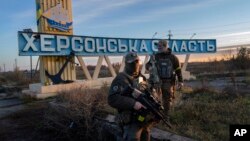Britain’s Defense Ministry said in its daily intelligence update Sunday that Russia’s recent withdrawal from Kherson “was conducted in relatively good order” and its success “is likely partially due to a more effective, single operational command under General Sergei Surovikin.”
The ministry said Russian vehicle losses were likely in the tens rather than the hundreds, while any left behind equipment was “successfully destroyed by Russian forces to deny it to Ukraine.”
The report warned, however, the Russian force “remains riven by poor junior and mid-level leadership and cover-up culture.”
Saturday, U.S. Defense Secretary Lloyd Austin said Ukraine's defense has global implications. At the Halifax International Security Forum in Canada, he warned that Russia's invasion of Ukraine offers a preview of a world where nuclear-armed countries could threaten other nations.
"Putin's fellow autocrats are watching," Austin said. "And they could well conclude that getting nuclear weapons would give them a hunting license of their own. And that could drive a dangerous spiral of nuclear proliferation," he added.
Austin also said Moscow's efforts to gain support from countries such as Iran and North Korea create new security challenges for the United States and its allies.
Earlier, the Pentagon's top policy adviser, Colin Kahl, said Russia is trying to deplete Ukraine's air defenses and achieve dominance over Ukrainian skies.
Russia has been pummeling Ukraine with missile strikes throughout the past week, the heaviest wave since Moscow invaded nine months ago.
"They're really trying to overwhelm and exhaust Ukrainian air defense systems," Kahl, the Pentagon's undersecretary of defense for policy, told reporters Saturday during a trip to the Middle East.
Kahl said that, so far, Russia has not succeeded in breaking the Ukrainian air force and air defenses.
"I think one of the things that probably surprised the Russians the most is how resilient Ukraine's air defenses have been since the beginning of this conflict," he said.
He attributed Ukraine's resilience to the "ingenuity and cleverness of the Ukrainians themselves in keeping their air defense systems viable," but he noted that "the United States and other allies and partners have provided a tremendous amount of support."
Britain pledged a $59.4 million air defense package Saturday for Ukraine, including anti-aircraft guns and technology to counter Iranian-supplied drones to Russia. British Prime Minister Rishi Sunak made the announcement on his first trip to Kyiv, posting a video of his visit on Twitter and pledging "We are with you all the way."
In Kyiv people woke up Saturday to several inches of snow. Ukrainian authorities in the capital are warning of a "complete shutdown," as subzero temperatures grip the country.
Russian airstrikes have inflicted heavy damage on the energy grid of the Ukrainian capital while they continue to pound Ukraine — from Kyiv in the north to Odesa in the south — crushing almost half of Ukraine's energy system, Ukrainian Prime Minister Denys Shmyhal said.
"They are determined to destroy our power grids," said Andriy Yermak, head of the Office of the President of Ukraine, in a speech at the Halifax forum.
"The calculation is simple: a humanitarian catastrophe. Moscow always considers frost and darkness as its allies. It always uses the deprivation of basic life needs as a war tool. It always despises humanitarian law. Russia is a terrorist state," Yermak said.
Amid freezing temperatures, difficulties with energy supplies persist throughout Ukraine — Ukrainian President Volodymyr Zelenskyy said Saturday, in his nightly video address.
"Energy workers are doing everything possible to give people a normal life," he said.
He added transport connections are being restored in Kherson.
"There is the first train from Kyiv. We create new opportunities for people every day," Zelenskyy said.
In message earlier Saturday, Zelenskyy also addressed the annual Halifax meeting.
"The end of the war doesn't guarantee peace. Russia is now looking for a short truce, a respite to regain strength … such a respite will only worsen the situation," he said.
Hundreds detained, missing in Kherson
A Yale University report backed by the U.S. State Department reveals that 226 people were detained or disappeared between March and October, during Russia's occupation of Kherson.
The Conflict Observatory, a Yale university research program supported by the department, released its independent report Friday. It describes numerous instances of unjust detentions and disappearances in Kherson.
"Russia must halt these operations and withdraw its forces to end a needless war that it cannot and will not win — no matter how despicable and desperate its tactics," a State Department statement said Friday.
Investigators in liberated areas of the Kherson region have uncovered 63 bodies bearing marks of what appeared to have been torture, Ukraine Interior Minister Denys Monastyrsky was quoted as saying.
VOA has not been able to independently verify those claims.
Russia denies its troops have targeted civilians or have committed atrocities during the war in Ukraine.
Some information for this report came from Agence France-Presse, Reuters and The Associated Press.





